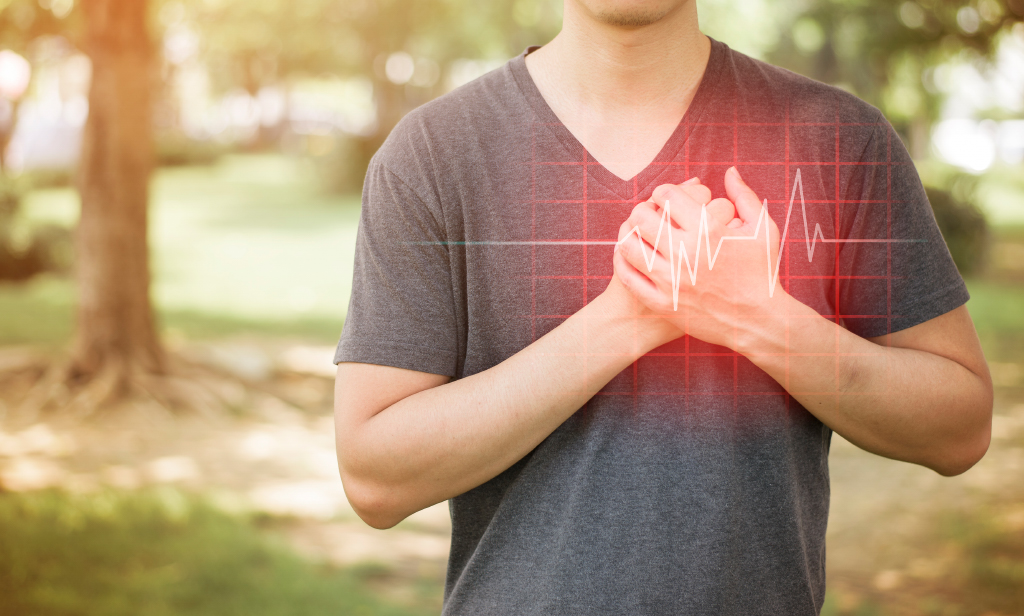Heart attack and heartburn are two completely different conditions but can have similar symptoms: Chest pain. This is the reason why some people get anxious to know if their health is at risk. Through this blog, we shall explore ways to tell the difference between heartburn and heart attack. However, if you’re ever unsure get medical advice, because it’s always better to be safe than sorry.
What is a Heart attack?
A heart attack (also called a myocardial infarction) is a condition of the heart when a major artery or arteries in the heart don’t get enough blood flow. As a result, the heart does not get enough blood and oxygen. The results can be chest pain, and other symptoms occur too.
Different arteries in the heart supply blood to different areas of the heart. Sometimes, a person’s symptoms can vary because of where they’re experiencing their heart attack. Other times, the symptoms are different because people’s bodies respond differently to a lack of blood flow and oxygen.
What is Heartburn?
Heartburn occurs when acid that’s usually in your stomach rises up into your esophagus (the tube between your mouth and stomach) and sometimes into your mouth due to excess acidity.
The acid in your stomach is meant to dissolve foods and nutrients. The stomach lining is strong enough so it’s not affected by the acid but as it reaches the esophagus, it produces a burning sensation. This causes chest pain and discomfort.
Symptoms
There is a minor difference between the symptoms of a heart attack and heartburn.
Heartburn
- A burning sensation in the upper part of the stomach radiates to the chest.
- Pain starts usually after eating.
- Mouth tastes sour.
- Burning sensation in the throat region too.
Heart attack
- “Fullness” in the chest.
- Shortness of breath
- Pain or discomfort in the neck, jaw, or back
- Discomfort in shoulders.
- Feeling weak or faint.
FAQs on Heart attack and heartburn quiz
- What makes your symptoms better?
With heartburn, sitting up and taking antacids usually helps the pain. Lying flat and bending forward makes it worse. With a heart attack, antacids and sitting up likely won’t improve your symptoms. Activity will usually make them worse.
- When did you last eat?
With heartburn, you’re most likely to have symptoms within a couple of hours after eating. If you haven’t eaten anything in a while, it’s less likely your symptoms are reflux-related. With a heart attack, your symptoms aren’t eating-related.
- Does the pain radiate?
With heartburn, your pain may go up to your throat. With a heart attack, the pain may go up to the jaw, back, or down one or both arms.
- Are you short of breath or sweating?
With heartburn, your symptoms should not usually be this severe. With a heart attack, these symptoms can indicate ischemia and a need to seek emergency medical attention.
Other causes of chest pain
Heart attack and heartburn aren’t the only causes of chest pain, but they’re the most common among others. Other potential symptoms include:
- Anxiety attack. Severe bouts of anxiety can cause panicked feelings that may make you feel as if your heart is racing. Other symptoms include shortness of breath and intense fear.
- Esophageal muscle spasm. Some people have an esophagus that tightens or spasms. If this occurs, a person can have pain and discomfort, such as chest pain.
- Gallbladder pain. The gallbladder is responsible for releasing bile that the body uses to digest fats. It can become blocked or diseased (such as with gallstones), causing symptomsTrusted Sources like pain in the shoulders, arms, and neck as well as nausea and vomiting.
- Pleurisy. This condition is an inflammation of the tissues in the chest wall, often due to intense coughing or inflammation from an infection.
What to do if you have chest pain
If you’re having chest pain that you think could be a heart attack, don’t drive yourself to the emergency room. Always call 911 or local emergency services so you can get medical attention as quickly as possible.
The more time the heart goes without proper blood flow, the more damage the heart muscle may undergo. This is why it’s not a good idea to wait or hesitate if you think you may be experiencing a heart attack.
The Takeaway
While a key symptom of both heart attack and heartburn is chest pain, there are other symptoms that can help differentiate between the two issues.
However, it’s always better to be cautious than to simply default to “I’m fine, it’s probably nothing.”
If you’re ever in a situation where you’re experiencing chest pain — especially if it comes on suddenly and is accompanied by pain in your shoulders or nausea — call 911 as soon as you can.

